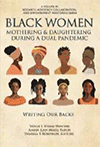
Black Women Mothering & Daughtering During a Dual Pandemic
Writing Our Backs
Edited by:
Venus E. Evans-Winters, Ohio State University and African American Policy Forum
Amber Jean-Marie Pabon, Kutztown University
Theresa Y. Robinson, Elmhurst College
A volume in the series: Research, Advocacy, Collaboration, and Empowerment Mentoring Series. Editor(s): Donna Y. Ford, Ohio State University.
In Press 2024
The contributors of this volume share with the scholarly community how they have learned to strive, resist, adapt, and re-conceptualize Black women's mental health and labor during the dual pandemics of white supremacy and COVID-19. This book is unique in that it calls for the contributing authors to draw upon and reflect on the use of sisterhood and a literacy circle to cope with an economic crisis, mass death, and racial battle fatigue during a worldwide pandemic. Specifically, the invited authors draw inspiration from Venus E. Evans-Winters' book Black Feminism in Qualitative Inquiry: A Mosaic for Writing Our Daughter's Body as an exemplar of research that both centers the issues and concerns of Black women scholar - practitioner - activists and presents a methodology consistent with Black feminist ways of knowing and expressions. Evans-Winters's theoretical and methodological writings are among the first works in research and gender studies that have successfully interwoven Black feminists' politics, spirituality, and Africanism with educational research and thought. Using constructed stories from the author's personal narratives, Black Women Mothering and Daughtering During a Dual Pandemic: Writing Our Backs addresses themes pertinent to Black women's lives, including our socialization and socioemotional development, mother/daughter and other mother-daughter relationships, navigating the racial politics of schooling, friendships, survivorship, and grief using non-normative methodological concepts and practices.
The authors explore concepts such as daughtering, politicking, mother speak, and cultural exchange while employing linguistic expressions such as prose, text messages, dialogue, and personal narrative—firmly planted in authentic Black womanist aesthetics. Furthermore, the authors highlight and demonstrate why and how they utilize reading and Black women's literary works to critically reflect, meaningfully write, heal, and do their work in times of peril (Morrison, 2019). More specifically, this book explores how the authors draw from Black women's cultural literacies in teaching, healing, mentoring, and activism. Throughout the question: How are Black women's literary works as a body of knowledge used in healing spaces to marshal new or forgotten healing methodologies, cultural frame of references, and spiritual awakenings? The contributing authors address this question from multiple perspectives, such as education, social work, and psychology.
Collectively, the authors advance Black women's mental wealth as a theoretical and methodological healing modality that meets their multiple identities as spiritual and cultural beings, educators, daughters, mothers, sisters, healers, and social activists. This is the first anthology to explore how Black women's literacy during a state of racial unrest and resistance alongside a global health pandemic shapes our cultural knowledge, ways of coping, and spiritual endeavors across varied--and often ambiguous contexts.
CONTENTS
-
Paperback979-8-88730-468-7
Web price: $45.04 (Reg. 52.99)
-
Hardcover979-8-88730-469-4
Web price: $80.74 (Reg. 94.99)
- eBook979-8-88730-470-0

- SOC001000 - SOCIAL SCIENCE: ETHNIC STUDIES: African American Studies
- SOC028000 - SOCIAL SCIENCE: Women's Studies
- PSY036000 - PSYCHOLOGY: Mental Health
-
 Healing While Studying
Reflections and Strategies for Healing, Coping, and Liberation of Graduate Students of Minoritized Identities
Healing While Studying
Reflections and Strategies for Healing, Coping, and Liberation of Graduate Students of Minoritized Identities
-
 No Ways Tired: The Journey for Professionals of Color in Student Affairs
Volume II - By and By: Mid-Level Professionals
No Ways Tired: The Journey for Professionals of Color in Student Affairs
Volume II - By and By: Mid-Level Professionals
-
 No Ways Tired: The Journey for Professionals of Color in Student Affairs
Volume III - We've Come a Long Way: Senior-Level Professionals
No Ways Tired: The Journey for Professionals of Color in Student Affairs
Volume III - We've Come a Long Way: Senior-Level Professionals
-
 Purveyors of Change
School Leaders of Color Share Narratives of Student, School, and Community Success
Purveyors of Change
School Leaders of Color Share Narratives of Student, School, and Community Success
-
 R.A.C.E. Mentoring and P-12 Educators
Practitioners Contributing to Scholarship
R.A.C.E. Mentoring and P-12 Educators
Practitioners Contributing to Scholarship
-
 Racism by Another Name
Black Students, Overrepresentation, and the Carceral State of Special Education
Racism by Another Name
Black Students, Overrepresentation, and the Carceral State of Special Education
-
 The Undivided Life
Faculty of Color Bringing Our Whole Selves to the Academy
The Undivided Life
Faculty of Color Bringing Our Whole Selves to the Academy

